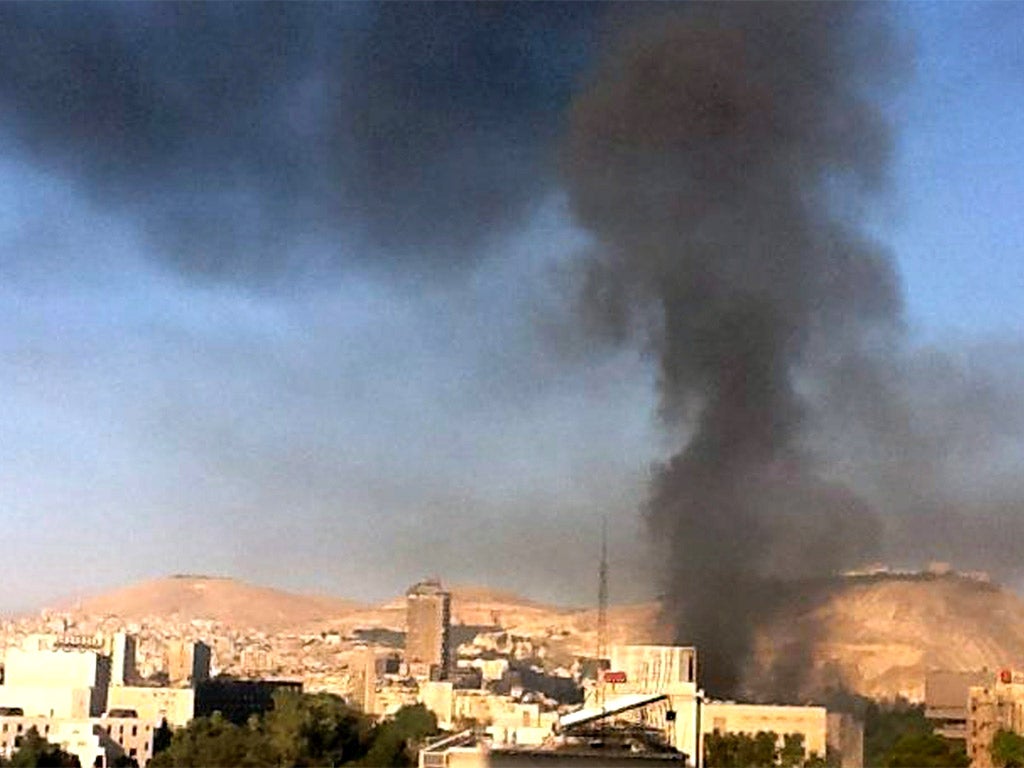Syrian rebels strike at heart of regime with twin bomb attack

Two massive suicide bombs were detonated in Damascus yesterday with a military command centre as a target in another example of the increasing reach of the revolution into the heart of the regime.
The explosive devices, packed into cars, killed four people and injured 14 others according to official reports. The Free Syrian Army, an umbrella group of rebel fighters claiming responsibility for the attack, maintained that "dozens of the enemy" had died in "a well-planned operation".
The blast set the building housing the General Staff Command on fire. The main gate of the complex was charred by the flames and debris of glass and masonry filled a deep crater gouged out on the road outside. Speaking to state television, President Bashar al-Assad's Information Minister, Omran Zoabi, said: "All our colleagues in the military leadership, the army staff command and the Defence Ministry are unhurt. It's a terrorist act, close to an important site, but as usual they failed to achieve their goal."
The attack took place, however, in Central Omayyad Square, one of the most secure areas of the Syrian capital since a bombing on 18 July which killed members of Assad's inner circle, including his brother-in-law, the Defence Minister and a senior commander.
Targeted assassinations, which have become a strategy of the brutal civil war, also continued. A Swiss-born correspondent of Iran's English-language channel, Press TV, Maya Naser, was shot dead by a rebel sniper and its Damascus bureau chief, Hussein Murtada, wounded while they covered the aftermath of the explosion.
Press TV said "foreign-based insurgents" were responsible.
Meanwhile, the opposition Local Coordination Committees in Syria reported that 275 people were killed across the country yesterday, making it one of the conflict's bloodiest days. Human rights activists from the UK-based Observatory for Human Rights claimed at least 16 people, including three children and six women, were executed by the Shabiha, the militia of the Alawite community from which the ruling elite is drawn.
Residents reported continuing gunfire for two hours after the attack at the defence headquarters and the second one on the perimeter of the complex, seemingly aimed at emergency teams being sent in. Samir al-Shami, an activist, said that after the second blast "the fighters went inside and clashed with security inside, while some of the men started to torch the building".
A reporter for al-Manar television, run by the Lebanese Shia group Hezbollah, allies of Assad, said he was in the building after the explosion and saw the bodies of three armed men, indicating that there were clashes between security forces and rebels at the site.
One nearby resident, Mohammed el-Klaib, said daily life was coming to a standstill. "Until recently the really dangerous fighting has been elsewhere. But now it is here, there are so many checkpoints that it is difficult to move around, to send our children to school. The bombs are getting closer."
Abu Osman, an officer with the rebel Farooq Brigade based in Homs, told The Independent: "They [the regime] are using tanks, artillery and jets. We are having to fight with what little we have, but what happened in Damascus proves that our mujahideen can get inside the areas from where they are planning operations against the civilians."
Yesterday's bombing came midway through the UN General Assembly meeting in New York, where Syria has been top of the agenda. The Emir of Qatar, Sheikh Hamad bin Khalifa al-Thani, called for Arab nations to intervene militarily to end an 18-month-old conflict. President Obama demanded an end to the Assad regime and the suffering of the Syrian people, but offered no plan for achieving that. Ban Ki-moon, the UN Secretary General, warned the conflict had become a "regional calamity with global ramifications".
Join our commenting forum
Join thought-provoking conversations, follow other Independent readers and see their replies
Comments
Bookmark popover
Removed from bookmarks